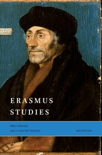
Erasmus Studies
Scope & Guideline
To Illuminate Thought: Discovering Erasmus' Impact Through the Ages
Introduction
Aims and Scopes
- Erasmian Humanism:
The journal focuses on Erasmus’ role in the humanist movement, examining his writings and their impact on Renaissance thought and scholarship. - Literary Analysis:
A significant portion of the journal's content is devoted to literary critiques and interpretations of Erasmus’ works, including his poetry, prose, and correspondence. - Theological Inquiry:
The journal explores theological themes in Erasmus' writings, particularly his views on faith, conscience, and scripture, contributing to discussions in Reformation studies. - Cultural and Historical Context:
Articles frequently contextualize Erasmus’ work within the broader cultural and historical landscapes of Europe, analyzing his influence on contemporary social and political issues. - Interdisciplinary Approaches:
The journal encourages interdisciplinary research, integrating perspectives from history, philosophy, literature, and theology to provide a holistic understanding of Erasmus’ contributions.
Trending and Emerging
- Gender Studies:
There is a growing emphasis on gender-related analyses in Erasmus’ works, as seen in discussions of feminine irony and civic harmony, reflecting broader trends in literary and cultural studies that interrogate gender dynamics. - Digital Humanities:
Recent articles indicate an increasing interest in applying digital humanities methods to Erasmus’ texts, including quantitative studies of paratexts, showcasing a merging of traditional scholarship with innovative technologies. - Civic and Social Thought:
Emerging themes around Erasmus’ thoughts on civic harmony and social responsibility suggest a renewed relevance of his ideas in contemporary discussions about ethics and community, engaging with modern societal challenges. - Intertextuality and Influence:
There is a noticeable trend towards exploring intertextual connections between Erasmus and other literary figures, indicating a shift towards understanding his influence on later literature and thought.
Declining or Waning
- Early Reformation Studies:
There has been a noticeable decrease in articles specifically focused on Erasmus’ role during the early Reformation, suggesting a potential waning interest in this aspect of his work. - Reception Studies:
Though previously a strong theme, the exploration of how Erasmus was received by contemporaries and later scholars appears to be less frequent in recent issues. - Comparative Studies with Other Humanists:
Comparative analyses between Erasmus and other humanists, such as Thomas More or Rabelais, seem to be declining, indicating a possible narrowing of focus on Erasmus as an individual figure rather than in relation to his peers.
Similar Journals

Seizieme Siecle
Exploring the Renaissance: Unveiling the 16th Century's Rich LegacySeizieme Siecle is a distinguished journal published by LIBRAIRIE DROZ SA, focusing on the rich tapestry of the 16th century—a pivotal period that shaped the arts, literature, and cultural studies. As a publication dedicated to bringing scholarly discourse to the forefront, it features a range of critical analyses and interdisciplinary studies that examine the multifaceted influences of the era. While the journal currently does not operate under an Open Access model, its commitment to quality research is reflected in its inclusion in Scopus, albeit with limited convergence years and relatively low rankings across various relevant fields in the Arts and Humanities. Researchers, professionals, and students interested in deepening their understanding of historical contexts and their artistic expressions will find valuable insights within the pages of Seizieme Siecle. With its base in Geneva, Switzerland, the journal offers a unique perspective, contributing significantly to the ongoing academic conversations surrounding the Renaissance and its lasting impact.
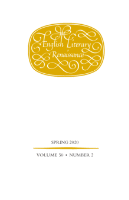
ENGLISH LITERARY RENAISSANCE
Advancing Scholarship in English LiteratureENGLISH LITERARY RENAISSANCE, published by University of Chicago Press, stands as a pivotal academic journal in the realm of Literature and Literary Theory. With a historical pedigree dating back to 1971, this esteemed journal has made significant contributions to the study of English literature, exploring a wide array of themes, methodologies, and critical interpretations that underscore the richness of literary discourse. The journal is ranked in the Q2 category for literature and literary theory and is positioned in the 89th percentile in the Scopus rankings, affirming its impact within the field. Although it does not operate under an open access model, ENGLISH LITERARY RENAISSANCE continues to attract a vibrant community of scholars and educators eager to engage with its rigorous scholarship and innovative approaches. This journal not only serves as a platform for groundbreaking research but also fosters critical dialogue that shapes the future of literary studies.

NOVYI MIR
Connecting Culture and Society through Scholarly InquiryNOVYI MIR, published by IZD STVO IZVESTIYA, is a distinguished journal that provides a platform for scholarly discourse in the humanities, literature, and cultural studies. With an ISSN of 0130-7673, this journal has made significant contributions to the academic community, particularly within Russia and Eastern Europe. Although it does not currently offer an open access model, its content is revered for its quality and depth, catering to researchers, professionals, and students alike. With a commitment to examining contemporary issues through a literary lens, NOVYI MIR is essential for those seeking to explore the intersection of culture and society. The journal's relevance is underscored by its esteemed reputation in literary circles, making it a vital resource for anyone dedicated to understanding the nuances of Russian literature and thought.
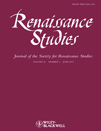
Renaissance Studies
Illuminating the Cultural Tapestry of the RenaissanceRenaissance Studies, published by Wiley, stands as a vital academic platform within the disciplines of Cultural Studies, History, Literature and Literary Theory, Religious Studies, and Visual Arts and Performing Arts. With an impressive history of publication spanning from 1987 to 2024, this journal is recognized in 2023 metrics as a Q2 journal in four categories and Q1 in Literature and Literary Theory, reflecting its substantial impact in promoting interdisciplinary dialogue and research. The journal's robust Scopus rankings further underscore its relevance, including a position in the 83rd percentile in Literature and Literary Theory. Although not an open-access journal, it provides readers and contributors with access to curated, high-quality scholarship that explores the complexities of the Renaissance and its enduring influence on contemporary thought and culture. Researchers, professionals, and students alike will find Renaissance Studies invaluable in fostering discussions that bridge historical context with modern inquiry.
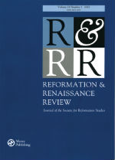
REFORMATION & RENAISSANCE REVIEW
Charting New Perspectives in Reformation and Renaissance StudiesREFORMATION & RENAISSANCE REVIEW is a distinguished journal published by Routledge Journals, Taylor & Francis Ltd, focusing on the rich and transformative periods of the Reformation and Renaissance. With an ISSN of 1462-2459 and an E-ISSN of 1743-1727, this journal provides a platform for scholarly discourse that examines the religious, cultural, and historical dimensions of these pivotal eras. Ranked in the fourth quartile (Q4) in Religious Studies, the journal plays a significant role in advancing our understanding of these fields, as indicated by its Scopus rank of #312 out of 644 in Arts and Humanities. Researchers, professionals, and students alike benefit from its rigorously peer-reviewed articles and insightful analyses. While currently not offering Open Access, the journal remains a vital resource for those exploring the complex interplay of faith and culture in early modern Europe. With a publication span from 2013 to 2024, this journal is committed to fostering scholarly excellence and encouraging innovative research that addresses contemporary debates within the disciplines of religious studies and history.
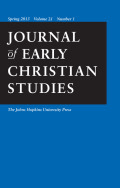
JOURNAL OF EARLY CHRISTIAN STUDIES
Exploring the Foundations of Faith and HistoryJournal of Early Christian Studies, published by Johns Hopkins University Press, is a prestigious academic journal that delves into the rich history and development of early Christianity. With an ISSN of 1067-6341 and an E-ISSN of 1086-3184, this journal has established itself as an essential platform for scholars and researchers interested in the intersections of religion, history, and culture from antiquity to the early medieval period. Ranked in the Q2 category in both History and Religious Studies as of 2023, it holds a commendable status within the academic community, reflected in its Scopus ranks. Though it does not offer open access, readers can expect rigorous peer-reviewed articles that contribute to ongoing dialogues in the field and leverage interdisciplinary approaches to the study of early Christian texts and practices. With a commitment to advancing knowledge from 2002 through 2024, the journal provides vital insights that appeal to researchers, professionals, and students alike, fostering a deeper understanding of early Christian narratives and their impact on contemporary thought.
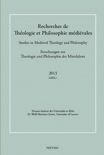
Recherches de Theologie et Philosophie Medievales
Fostering Dialogue on Medieval Intellectual HeritageRecherches de Theologie et Philosophie Medievales is a distinguished scholarly journal dedicated to the exploration of medieval theology and philosophy, published by PEETERS in Belgium. With an ISSN of 1370-7493 and an E-ISSN of 1783-1717, it has become an essential resource for researchers and scholars within its domain since its inception in 1996. This journal occupies a notable position, recognized in the Q3 category across critical fields such as History, Philosophy, and Religious Studies in 2023, showcasing its valuable contribution to academic discourse. The journal ranks impressively in Scopus, holding positions of #202, #576, and #327 in Religious Studies, History, and Philosophy respectively, placing it in the 68th, 67th, and 59th percentiles. Though it operates under traditional access models, its rigorous peer-reviewed articles provide in-depth analyses and perspectives that are invaluable for students, academics, and professionals alike, making it an indispensable component of medieval studies.
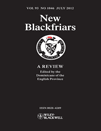
New Blackfriars
Cultivating Intellectual Growth Across Disciplines.New Blackfriars is a distinguished biannual journal published by WILEY, focusing on the interdisciplinary study of theology, philosophy, and ethics. With its ISSN 0028-4289 and E-ISSN 1741-2005, this journal serves as a vital platform for scholars and practitioners in the field, exploring contemporary issues and insights that shape our understanding of faith and moral philosophy. The journal aims to foster dialogue and scholarship, bridging historical perspectives with modern-day implications, thereby contributing to the intellectual growth of researchers, educators, and students alike. Although New Blackfriars is not an open-access journal, it continues to maintain a robust academic reputation, making significant contributions to the discussions around spirituality and societal values. Located in Hoboken, NJ, at 111 River St, this publication stands as an essential resource for those committed to the study and application of critical theological thought in an ever-evolving world.

Revista de Letras
Connecting Ideas: Literature, Philosophy, and BeyondRevista de Letras is an esteemed academic journal published by Universidade Estadual Paulista (UNESP), dedicated to the fields of Literature and Literary Theory, as well as Philosophy. With its ISSN 0101-3505 and E-ISSN 1981-7886, the journal serves as a significant platform for the dissemination of scholarly research and critical thought, particularly within the Brazilian context and beyond. Operating from Araraquara, SP, Brazil, the journal spans the period from 2004 to 2023, featuring a diverse array of articles aiming to explore various literary and philosophical discourses. Despite its current Q4 ranking in both the Literature and Literary Theory and Philosophy categories, the journal continues to foster a vibrant academic community, promoting rigorous scholarship and intellectual engagement. Researchers, professionals, and students alike are invited to contribute to and engage with the evolving narratives presented in this publication, aiming to enhance understanding and facilitate discussions within these crucial fields.
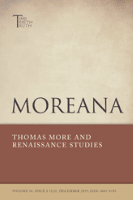
MOREANA
Exploring the Intersections of History, Law, and FaithMOREANA is a distinguished academic journal published by Edinburgh University Press, dedicated to the fields of History, Law, and Religious Studies. With an ISSN of 0047-8105 and an E-ISSN of 2398-4961, this journal has been a vital resource for scholars since its inception in 1975. Although it currently holds a Q4 ranking in multiple categories, including History, Law, and Religious Studies, its contributions remain significant, addressing crucial discourses and fostering interdisciplinary dialogues. The journal, based in France, continues to serve the academic community through its commitment to publishing high-quality papers that explore a wide array of topics pertinent to its fields of study. Researchers, professionals, and students alike will find MOREANA an essential platform for engaging with contemporary issues, historical analyses, and legal perspectives. Despite its challenging ranking, the journal advocates for the relevance of less mainstream discussions in academia while striving for improvement and recognition within the scholarly community.